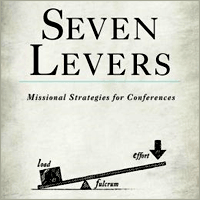Bishop Robert Schnase, author of the popular Five Practices of Fruitful Congregations (Abingdon, 2007), has inspired thousands of congregations to focus on what is most essential to their mission and vitality. His newest book, Seven Levers: Missional Strategies for Conferences (Abingdon Press, 2014), considers church renewal from a different vantage point. It examines the function of Annual Conferences (United Methodist regional judicatory bodies) and is written for an audience concerned with denominational polity and connectional relationships. Yet many of the book’s underlying themes have great relevance for congregational leaders. Bishop Schnase has an astute grasp of the reality facing the church today. And he acknowledges that the ultimate objective in reforming conference-level ministries is to strengthen local congregations. What are some key lessons that all church leaders can take from Seven Levers?
Schnase has little patience with those who stand pat, believing the church’s future is in God’s hands. This view, he says, “asks God to do for us what God created us to do for God.”
Seize the day. Bishop Schnase reminds us that decisive action is required to counteract institutional stagnation and decline. He has little patience with those who stand pat, believing the church’s future is in God’s hands. This view, he says, “asks God to do for us what God created us to do for God.” He has a special word for the many congregations who do not face imminent crisis yet each year slowly grow smaller and older. If nothing changes this trajectory, they will eventually reach the point where they no longer have the personal or financial resources to reverse course. Intentional strategies are needed to combat the complacency and stagnation that lead to slow, subtle, irreversible decline.
Seek outside perspectives. In this book, Bishop Schnase describes a successful program in the Missouri Conference that helps congregations rethink their mission and reboot their ministry. Key to the program’s success are clues that come from “mystery visitors” who evaluate the receptivity of the congregation to newcomers and record their observations. The churches also receive recommendations of outside consultants who meet with church members and leaders. To break away from ingrained habits and patterns of ministry, congregations must find ways of seeing themselves as others do and opening themselves to new ideas.
Focus outwardly. Churches are called to fulfill their mission at the edges of their faith community, not within them, by inviting, serving, proclaiming justice, sharing faith, and transforming lives. Healthy churches have “permeable edges,” he reminds us, where new people enter and where members reach out. Leaders constantly draw attention to what happens at this margin. They draw resources from the center to the circumference.
Multiply ministries. Bishop Schnase recommends redoubling church planting efforts and new ways of supporting campus ministry. Although these areas of outreach are often thought of as denominational responsibilities, he advocates new, more innovative approaches that have as their common denominator a high level of congregational initiative and ownership. Going forward, successful, forward-thinking congregations will be more proactive in multiplying ministries in a variety of new and different ways, including launching new faith communities. Bishop Schnase posits this important maxim: New reaches new.
One sub-point in his discussion of campus ministry that has relevance for a variety of congregational outreach efforts is the challenge of “scalability.” Too many of our ministry models have limited growth potential because everything centers around one person. They reach a ceiling once a few dozen people are involved because that is the maximum number of people a single leader can relate to individually. “The challenge,” writes Bishop Schnase, “is to develop a system that revolves around more than one person or location, with multiple connectors and settings. … Then a ministry grows by multiplication rather than simple addition.”
Prepare and support leaders. In this text, Bishop Schnase makes a strong case for the power of groups and peer learning experiences in shaping and supporting effective leaders. Lessons conferences have learned in their efforts to prepare and support clergy leaders have important implications for how congregations form and equip their lay leaders and staff. Leadership development cannot be left to chance. Jesus modeled how leaders are formed in community.
 “Complexity,” says Bishop Schnase, “is the silent killer of organizations.” When overly focused on internal mechanisms and institutional structures, institutions lose sight of their mission and become irrelevant and impenetrable to outsiders. In this regard, the book’s prescription for conferences applies equally to congregations. Organize in a way that values ministry over meetings. Make sure that your decision-making processes and governance structures are nimble enough to serve your mission.
“Complexity,” says Bishop Schnase, “is the silent killer of organizations.” When overly focused on internal mechanisms and institutional structures, institutions lose sight of their mission and become irrelevant and impenetrable to outsiders. In this regard, the book’s prescription for conferences applies equally to congregations. Organize in a way that values ministry over meetings. Make sure that your decision-making processes and governance structures are nimble enough to serve your mission.
Throughout, Seven Levers is a case study in how to approach institutional leadership with an outward gaze, a disciplined focus on outcomes, and a strategic understanding of the avenues of influence and agency available. The book is designed for those engaged in judicatory matters, but there is also much wisdom that others can glean.
Seven Levers: Missional Strategies for Conferences (Abingdon Press, 2014) can be purchased through Cokesbury or Amazon.
Related Resources:







